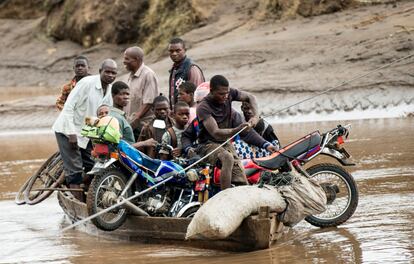African nations consider swapping debt for climate funding
The ‘debt-for-climate swap’ option is an economic tool that allows a country’s debt to be reduced in exchange for commitments on green investments

African countries saddled with debt and ravaged by losses and damages from weather events like cyclones, drought and extreme temperatures have agreed to consider swapping debt to invest in climate action in a meeting of finance ministers in the Ethiopian capital Addis Ababa.
The “debt-for-climate swap” option is an economic tool that allows a country’s debt to be reduced in exchange for commitments on green investments. It was among several alternative green financing models discussed at the ongoing United Nations conference for finance and economic ministers that supporters say would boost funds to adapt to climate harms, protect nature and finance local communities.
It comes as many African nations are battling with the effects of costly climate change-fueled events like the ongoing drought in eastern Africa that has killed thousands and decimated livelihoods reliant on rain-fed agriculture and the aftermath of the devastating Cyclone Freddy in the south that’s left hundreds dead and thousands of others displaced.
Egyptian finance minister Mohamed Maait said that his country is one of many that is now having to add heavy climate costs to budgets stretched thin by external debt — which takes up to 17% of countries’ spending in some cases — and other basic needs.
“What am asking every day and every hour is where do I get the money to protect our people from climate extremes,” Maait said, adding that borrowing was often the only option for some nations.
Yet “many countries simply cannot access international financial markets because of rising interest rates,” Hanan Morsy, the chief economist of the U.N. Economic Commission for Africa told the roundtable Monday evening. Morsy added that private sector investments in climate finance are lower in Africa than in any other part of the world.
Ministers also discussed bonds that would help increase private financial flows as well as “blended finance” models that would combine development funds and private capital as potential solutions for climate funding.
Interest in green finance has been growing, along with criticism that current mechanisms don’t work for countries ravaged by climate extremes but have contributed little to the planet-warming emissions in the atmosphere.
In 2022 the International Monetary Fund established a $50 billion climate loan pot to help low and middle-income nations access affordable and longer-term financing to respond to shocks associated with climate change. Rwanda became the first African nation to receive a loan of $319 million.
But another $50 billion pot pledged by the World Bank is only sending around 5% of its funds to the ten most climate vulnerable countries, according to a recent study by the Center for Global Development. Four of the ten nations identified — Mali, Niger, Sudan and Liberia — were in Africa.
The ministers’ roundtable coincided with the Green Climate Fund board meeting, a group within the U.N. climate agency that financially supports nations to adapt to or curb climate change. On Monday the fund approved $580 million in new climate finance for developing nations.
Sign up for our weekly newsletter to get more English-language news coverage from EL PAÍS USA Edition
Tu suscripción se está usando en otro dispositivo
¿Quieres añadir otro usuario a tu suscripción?
Si continúas leyendo en este dispositivo, no se podrá leer en el otro.
FlechaTu suscripción se está usando en otro dispositivo y solo puedes acceder a EL PAÍS desde un dispositivo a la vez.
Si quieres compartir tu cuenta, cambia tu suscripción a la modalidad Premium, así podrás añadir otro usuario. Cada uno accederá con su propia cuenta de email, lo que os permitirá personalizar vuestra experiencia en EL PAÍS.
¿Tienes una suscripción de empresa? Accede aquí para contratar más cuentas.
En el caso de no saber quién está usando tu cuenta, te recomendamos cambiar tu contraseña aquí.
Si decides continuar compartiendo tu cuenta, este mensaje se mostrará en tu dispositivo y en el de la otra persona que está usando tu cuenta de forma indefinida, afectando a tu experiencia de lectura. Puedes consultar aquí los términos y condiciones de la suscripción digital.








































